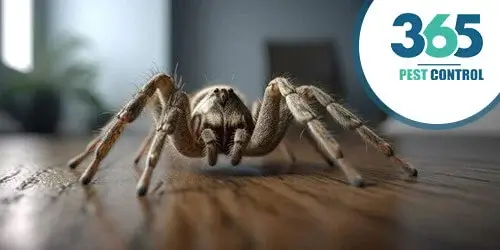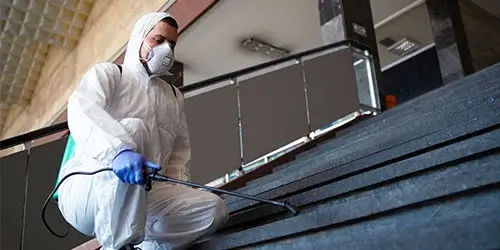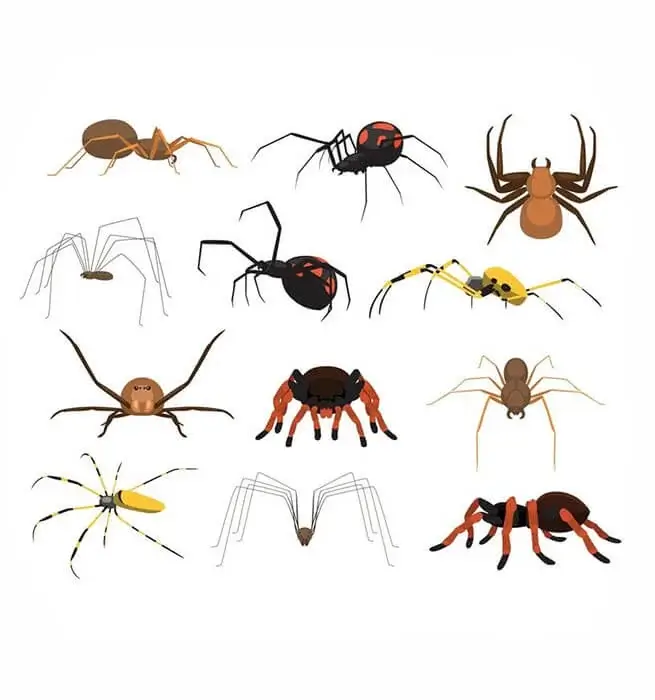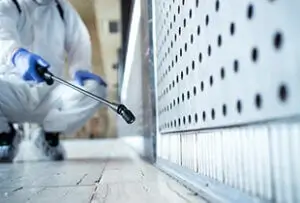
Spider Pest Control Melbourne, VIC
Among the many spiders in Melbourne, some are known for their deadly bites. If you see spider webs or want to have them removed, you will need professional spider removal services. 365 Pest Control Melbourne provides comprehensive spider control treatments for Melbourne’s residential and commercial properties to make them safe and clean.
We offer tailored spider treatment services based on the type of spider at your property, the level of infestation, and other factors. Our treatment services also include long-term spider pest control strategies for your property. Get more information about our preventative spider control and prevention services by calling (04)33949536.

365’s Spider Control Services Melbourne

Household Spider Control Spray Treatments
Household spider control spray treatments use specially formulated insecticides to target and eliminate spiders in indoor living spaces. Spraying for spiders is designed to be applied directly to areas where spiders are commonly found. It includes cracks, crevices, corners, and other hiding spots. The treatment aims to reduce spider populations and web-building activity, creating a more comfortable and spider-free environment.

Industrial Spider Control SprayTreatment
Industrial spider control spray treatments involve the application of specialized insecticides in large-scale commercial or industrial settings to manage and eliminate spider infestations. Spraying for spider treatments targets areas where spiders are likely to hide, such as warehouses, factories, storage facilities, and other commercial spaces. The goal is to reduce spider populations, minimize web buildup, and create a safer and more hygienic environment for workers and products.
Process of Our
Spider Pest Control Treatment Plan

Inspection
Inspection

Web Removal
Web Removal

Identification of High-Risk Areas
Identification of High-Risk Areas

Preventive Measures
Preventive Measures

Customized Treatment Selection
Customized Treatment Selection

Follow-up Inspections
Follow-up Inspections

Application of Spider Control Products
Application of Spider Control Products

Ongoing Monitoring
Ongoing Monitoring
Reason to Choosing 365 for Spider Pest Control in Melbourne, VIC
- Qualified & well exp. Technicians
- Environmental friendly products
- Police check employees
- Always arrive on time
- Clean & calibrated equipment
- Quick response
- No smelly odours
- Guaranteed results
- Comprehensive support
- Focus on pest prevention
Request a Callback
FAQ on Spider Pest Control
Ans. You should turn off the outdoor lights if you want to keep spiders away since the light doesn’t attract spiders by itself. It does, however, remove the pests spiders eat. Spiders typically invade your home on purpose to hunt for food. Other bugs are preferred as their diet. Turn out any outdoor lights after a decent hour since these insects are most attracted to them.
Using citronella candles inside and outside your home would also help. Polish furniture and cleansers with a lemon scent will also work. Smear citrus peel over skirting boards, windowsills, and bookcases, since spiders hate the smell of citrus.
Since spiders dislike citrus odours, you can also use citrus peels to cover skirting boards, windowsills, and bookcases. Finally, it would help if you used citronella candles inside and outside your home, as well as furniture polish and cleaners that smell like lemons.
Ans. Ensure that you seal cracks around pipes, beneath doors, and around firewood stacks to prevent access to your home. You should also remove any items you may find hiding on your property, including garden bags, compost piles, and general debris.
Make spider flies less attractive by using illumination. Regularly vacuum high and low, especially behind or under large pieces of furniture, cabinet backs, and worktops.
As a precaution, wear rubber gloves when moving boxes and containers in dark places, such as your basement or storeroom, because spiders might have already infiltrated these spaces.
Ans. Due to their primary purpose of killing and scaring spiders, many of these sprays are poisonous. Pyrethroids, a resin found naturally in dried chrysanthemum flowers, are used to make several spider sprays. As part of a pesticide that repels spiders, pyrethroids are combined with other compounds in modest amounts.
Almost all spider sprays are poisonous. Pyrethroids are hazardous to humans and pets, though they are not as toxic as other sprays. They can cause illness, dizziness, headaches, and nausea in humans. Fish can be extremely harmful or even lethal to aquatic pets, so take extra precautions if you have them.
Ans. When it comes to spider removal, there is no standard cost in the pest control business. However, it would be helpful if you were prepared to spend between $100 and $200 to get rid of a spider infestation in your house immediately. As a result of the seriousness of the problem, additional services or regular maintenance may also be required.
Supplies and the time it takes for a skilled, licensed expert to complete the job are two factors affecting spider control services. It’s probably not a good deal if it seems too good to be true.
Since the quality of the work can often influence the price of a service or the absence of a warranty, you should be cautious when buying a service that is priced notably low. If you need more information about spiders in your home or if you need a free, no-obligation estimate, please contact us at (04) 33 949 536 or fill out the form on our website.
Ans. In Australia, white-tailed spiders often invade our homes and reside under bark, logs, and leaf litter. They are most active at night, searching for other spiders, such as blackhouse spiders.
There are also redbacks in Australia, but they are less common in cooler areas. They can be found in backyards. Throughout Australia’s eastern coast, the highlands (from Queensland to Tasmania), and some isolated parts of South Australia, funnel-web spiders are common.
In addition to living on the ground, some live in trees. For example, mouse spiders live in Melbourne, Australia, where they dig burrows in damp, cold, protected environments. Despite occasionally inhabiting residential gardens, the mouse spider usually lives in underground tunnels near streams and rivers.
Ans. Because spiders hate vinegar more than cats hate hot baths, they stay away from it. They will tremble when they smell vinegar of any kind. Spray your home with a mixture of half a bottle of vinegar and half a bottle of water. Sprinkle it on the spider if you see it.
Natural spider repellents are another way to keep spiders at bay. They are easy to use. Unfortunately, citrus fruits like lemons and oranges are repellent to these eight-legged critters. As well as peppermint, tea tree, eucalyptus, and vinegar, they are allergic to them.
Also, use citronella candles inside and outside your home, polish furniture and cleaners with a lemon scent, and plant citrus trees in your garden to discourage spiders.
Learn More About Spider

Feeding and Predation
Spiders are carnivorous and feed on insects and other small arthropods. They use their silk to create traps; some spiders hunt by ambushing their prey. Spiders are equipped with venomous fangs called chelicerae, which they use to inject venom into their game. The venom immobilizes or kills the target, and digestive enzymes break down the tissues, allowing the spider to consume the liquefied contents.

Anatomy
Spiders have two main parts: the cephalothorax and the abdomen. The cephalothorax contains the head and thorax, where the spider's legs and mouthparts are attached. The core is the rear portion of the body.

Reproduction
Spiders reproduce sexually; the male transfers sperm to the female using specialized structures called pedipalps. After mating, females may lay eggs in silk egg sacs, which they guard until hatching. The young spiders, known as spiderlings, undergo moults as they grow and develop.
Common Types of Spiders in Australia:
Orb-weaver spiders: Known for their intricate, wheel-like webs.
Wolf spiders: Active hunters that do not build webs and often carry egg sacs.
Jumping spiders: Agile hunters with excellent vision, known for their unique mating dances.
Tarantulas: Large, hairy spiders kept as pets. They are mostly harmless to humans.
Black widow spiders: Recognized by their red hourglass-shaped markings. Females are venomous.
Brown recluse spiders: Identified by a violin-shaped mark on their bodies. Their bites can cause tissue damage.




